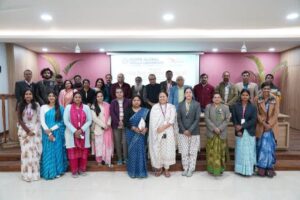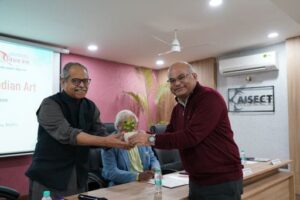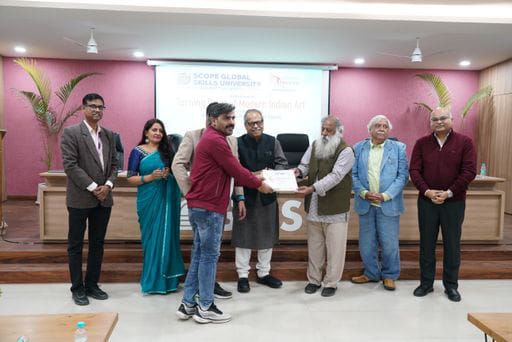CNN Central News & Network–ITDC India Epress/ITDC News Bhopal: Scope Global Skills University’s Faculty of Humanities and Liberal Arts (Tagore School of Fine Arts) organized a special workshop on the theme “Turning Point of Indian Art – In Reference to Amrita Sher-Gil and Rabindranath Tagore” at Vanmali Auditorium. The event featured renowned artist, author, and art critic Ashok Bhawmik as the chief guest, with Devilal Patidar and Sunil Shukla as special guests. Key university figures including Vice-Chancellor Ajay Bhushan, Registrar Sitesh Kumar Sinha, Dean of Humanities and Liberal Arts Tina Tiwari, and Head of Tagore School of Fine Arts Arjun Kumar Singh were also present.
Workshop Highlights
The program began with a welcome address by Vice-Chancellor Ajay Bhushan, who emphasized the significance of skill universities in the current era. Arjun Kumar Singh, Head of the Tagore School of Fine Arts, introduced the workshop’s concept and objectives.

In his keynote address, Ashok Bhawmik reflected on the evolution of Indian art. He explained that earlier, Indian artists lacked creative freedom due to religious and state restrictions, which dictated the content and style of their work. This limitation was first challenged by Raja Ravi Varma, who established his own studio and created paintings that resonated deeply with the public. He paved the way for modern Indian art, which was further advanced by Rabindranath Tagore and Amrita Sher-Gil.
Tagore broke away from the narrative-driven tradition of storytelling in art, focusing instead on visual language and common subjects. Similarly, Amrita Sher-Gil emphasized ordinary people and women as central themes in her works, moving away from conventional storytelling. Bhawmik termed this shift as a “turning point” that gave modern Indian art its unique identity, inspiring future generations.
Devilal Patidar encouraged the audience to stay connected to their traditions while advancing art and culture. Sunil Shukla highlighted the current challenges in the art world, including the rise of artificial intelligence and the need for originality in art education. He stressed the importance of workshops like these to promote original thinking and creativity in the AI era.

Acknowledgments and Closing
The program concluded with a vote of thanks by Tina Tiwari, Dean of Humanities and Liberal Arts, who expressed gratitude to the chief guest, attendees, artists, and faculty members. She acknowledged the contributions of Sitesh Kumar Sinha, Registrar of SGSU, and the ongoing support of Chancellor Siddharth Chaturvedi. Appreciation was also extended to the faculty and students of the university.
Key Takeaways:
The workshop explored the evolution of Indian art and its turning points, connecting historical milestones with modern-day challenges. It underscored the importance of originality and tradition in the evolving landscape of art education.
Would you like this formatted into a summary or expanded further?
#IndianArt #SGSUWorkshop #ArtTurningPoint #CulturalHeritage #AshokBhawmik







